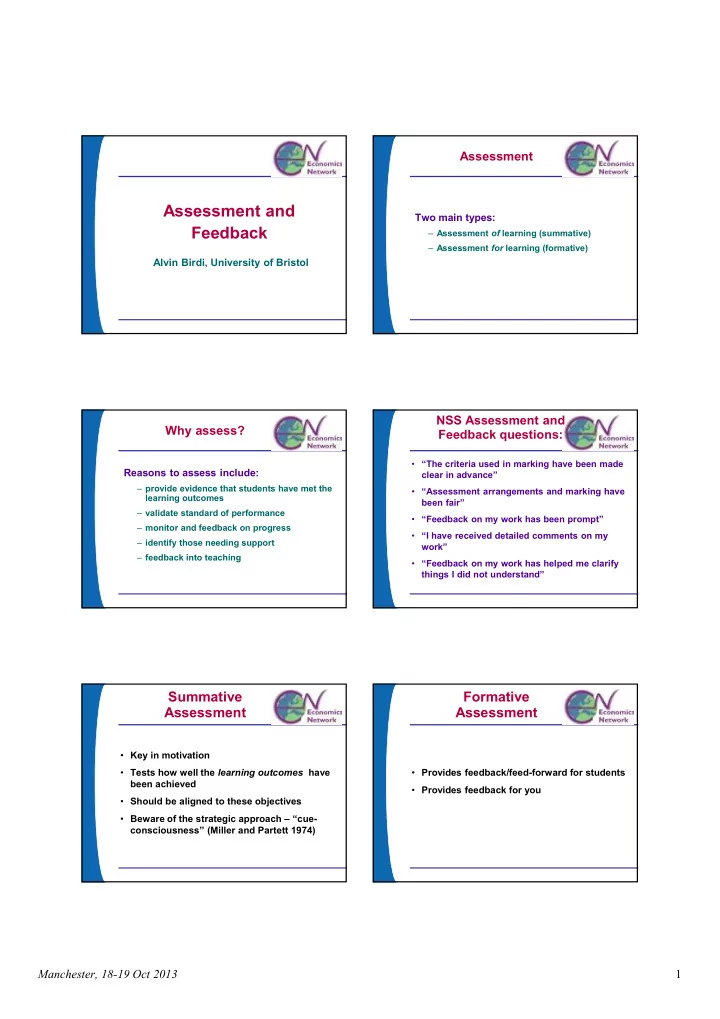

Assessment www.economicsnetwork.acuk www.economicsnetwork.acuk Assessment and Two main types: Feedback – Assessment of learning (summative) – Assessment for learning (formative) Alvin Birdi, University of Bristol NSS Assessment and Why assess? Feedback questions: www.economicsnetwork.acuk www.economicsnetwork.acuk • “The criteria used in marking have been made Reasons to assess include: clear in advance” – provide evidence that students have met the • “Assessment arrangements and marking have learning outcomes been fair” – validate standard of performance • “Feedback on my work has been prompt” – monitor and feedback on progress • “I have received detailed comments on my – identify those needing support work” – feedback into teaching • “Feedback on my work has helped me clarify things I did not understand” Summative Formative Assessment Assessment www.economicsnetwork.acuk www.economicsnetwork.acuk • Key in motivation • Tests how well the learning outcomes have • Provides feedback/feed-forward for students been achieved • Provides feedback for you • Should be aligned to these objectives • Beware of the strategic approach – “cue- consciousness” (Miller and Partett 1974) Manchester, 18-19 Oct 2013 1
Formative Writing Assessment Assessment Tasks www.economicsnetwork.acuk www.economicsnetwork.acuk What do we know about good feedback? See Gibbs and Bloom’s or SOLO (Biggs) taxonomy: Simpson 2004 in LTHE 1(1). • Timely (2/3 weeks?) Generalise, theorise, reflect • Individual (but see below) Compare, explain, analyse • Constructive and “feed-forward” Enumerate, describe • Prioritised and manageable Identify • Realistic • Honest • Group feedback valuable for students to see common errors (and time-saving) Writing Writing Assessment Tasks Assessment Tasks www.economicsnetwork.acuk www.economicsnetwork.acuk Outline the Hotelling Model and explain how the time to exhaustion of a resource depends on the market structure. Is oil running out and should we worry if it is? Use the Hotelling Model to consider whether oil has a future in the energy mix of the UK. Writing Writing Assessment Tasks Assessment Tasks www.economicsnetwork.acuk www.economicsnetwork.acuk � Do the questions allow students to go beyond the • Avoid “closed” questions threshold? � Do questions allow students to discern the • Make sure that the learning objectives can be critical aspects or are they given in the question? demonstrated (validity) � Are a range of responses possible? See – Outline the Hotelling Model and show that a Bloom/SOLO. monopoly might preserve oil for longer than a � Do they allow weak students to identify competitive firm. ??? themselves? (i.e can a third class student get a third?) • Make questions “meaningful” (authenticity) � Use marking criteria (specific to the task) Manchester, 18-19 Oct 2013 2
Writing Assessment Tasks www.economicsnetwork.acuk www.economicsnetwork.acuk Writing Writing Assessment Tasks Assessment Tasks www.economicsnetwork.acuk www.economicsnetwork.acuk Example Specific Criteria • Sound knowledge of topic and use of appropriate � Technical questions: terminology • Ability to analyse shown using techniques from � Give a lot of marks for the first few parts the module. Critical thinking shown � Ratchet up the difficulty • Make use of relevant reading and appropriate referencing � Have a difficult or interpretive final part so that excellent students can distinguish themselves • Good structure which makes your argument clear and coherent • Good use of English with few grammatical mistakes More Tips Tips www.economicsnetwork.acuk www.economicsnetwork.acuk • Tips � Tips – Infrequent assessment encourages irregular � Don’t have too much choice – why not? work patterns and surface learning � Use short answer questions to test lower order skills and essays for higher order. – Use a variety of methods - see various assessment chapters in EN Handbook. � Avoid predictability – Use variety within examinations and also questions. – Avoid testing the same outcomes repeatedly Manchester, 18-19 Oct 2013 3
Can We Avoid Can we avoid Drowning? drowning? www.economicsnetwork.acuk www.economicsnetwork.acuk • A report as if to a government minister, World Bank etc. • A presentation to explain an economic issue to a lay audience MCQ – e.g. economic impact of the Olympics Economics Network Question Bank http://www.economicsnetwork.ac.uk/qnbank/ • Standardised tick-box forms Technology-enhanced marking • Masterclasses to replace seminar groups eAssignment • TA marking http://www.jisc-ea.soton.ac.uk/resources/ • B logs podcasts of answers/common errors statement banks Group work http://www.economicsnetwork.ac.uk/development Useful links www.economicsnetwork.acuk • Phil Race’s compendium on writings on assessment http://phil-race.co.uk/most-popular-downloads/ • Re-Engineering Assessment Practices http://www.reap.ac.uk/reap/nss/index.html • Economics Network themed assessment page http://www.economicsnetwork.ac.uk/themes/assessment • Economics Network Assessment Question Bank http://www.economicsnetwork.ac.uk/qnbank/ Manchester, 18-19 Oct 2013 4
Recommend
More recommend